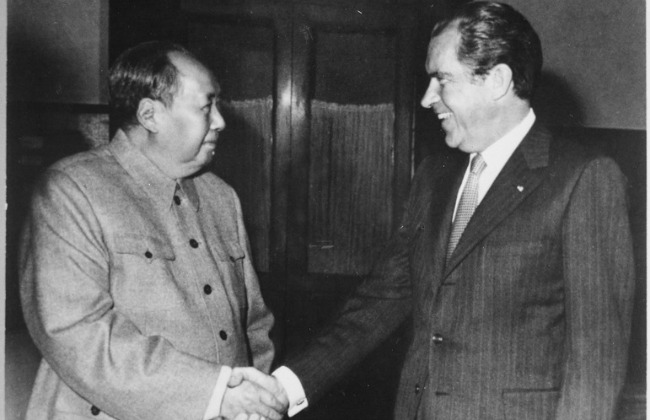At The Atlantic, Matt Schiavenza surveys the dynamic 60-year relationship between Beijing and Washington. The article opens a time capsule of international relations analysis to compare a view from 1958 to the situation today, and to ask how contemporary evaluations might hold up in a half-century:
In October 1, 1949, Mao Zedong stood atop Beijing’s Tiananmen, China’s most important national monument, and proclaimed the founding of the People’s Republic of China. The moment—still replayed on Chinese television—marked the culmination of China’s “century of humiliation,” a period of near-constant chaos, instability, and foreign meddling.
For the United States, the Communist takeover in China meant that suddenly, the world’s largest country by population was suddenly an ally of the U.S. enemy, the Soviet Union. This alliance proved especially costly to Washington during the Korean War, when Chairman Mao’s troops came to the aid of the North Koreans, repelling American-led forces back to the 38th parallel.
[…In 1958] China was nearing the end of its first decade under Communist rule, a period of great challenges—but optimism—in the country. Years of war had destroyed China’s infrastructure and what little industry the economy had, but the country had finally achieved its treasured independence. As a Communist country, China was within the Soviet Union’s orbit—and Moscow provided Beijing with technical and financial assistance throughout the 1950s. For Taylor and many other observers at the time – China and the Soviet Union were natural allies.
Less than two years later, the two countries completely severed ties. And in 1972, the United States and the People’s Republic China established relations for the first time in decades, initiating an uneasy relationship that persists today.
So, what happened? […] [Source]
Also see a recent interview with Orville Schell from the Global Times, in which the co-author of the new book Wealth and Power: China’s Long March to the Twenty-First Century fields questions about China’s rise and shares his view on the future of U.S.-China relations.








